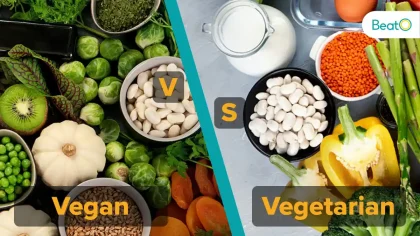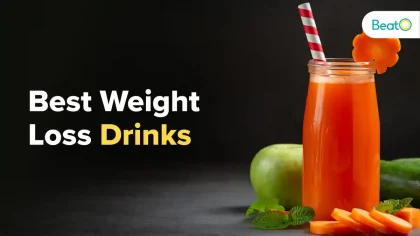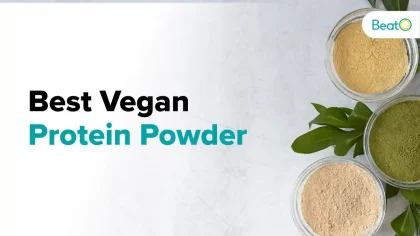Although “vegan” is sometimes confused with “vegetarian”, these terms do not mean the same. Plant-based diets are often confused with vegetarian or vegan, but these terms have distinct differences.

Here in this article, we’ll delve into what makes vegans different from vegetarians, and talk about the benefits you need to know before choosing one.
Also Read: Must-Try Vegan Dinner Recipe Ideas
Vegan vs Vegetarian: What’s the Difference and Which is Better?
What is a Vegetarian Diet?
A vegetarian diet is based on the exclusion of meat, eggs, and seafood from the diet, basically, everything that comes from animal slaughter. Individuals top their reasons with health considerations, animal rights, and environmental factors for being a vegetarian. The inclusion of eggs is debatable, and people are divided in this argument deciding whether can eggs be included in a vegetarian diet or not. However, within the vegetarian community, there are sub-categories based on the types of animal products included in the diet:
- Lacto-vegetarians consume all dairy products, while completely avoiding eggs, meat, poultry, and fish.
- Eggs can be consumed by the Ovo-Vegetarians but poultry and fish are excluded from their diet, as well as dairy products and meat.
- Lacto-ovo vegetarians are the ones who consume dairy products and eggs but do not eat meat, poultry, and fish.
Also Read:Top 15 Vitamin K2 Foods For Bone Health And Blood Clotting
What is a Vegan Diet?
A vegan diet follows a vegetarian diet by going one step further, excluding all forms of animal (meat, eggs, milk or their derivatives) from the diet. No animal product is left out; this includes milk, eggs, and honey, while meat, poultry and fish are obvious ones as these come from animal slaughter.
Veganism is frequently just a diet for some people but for some, it can be more. For them, it may not be a part of merely a diet but a part of their lifestyles and it also makes them avoid using animal products or by-products in clothes and cosmetics. The reason for adopting a vegan lifestyle functions in three major ways: health issues, concerns for the animals and environmental aspects.
Vegan vs Vegetarian: Nutritional Considerations
Even though vegans and vegetarians may benefit from their options, it is difficult to tell whether they fully meet the nutrition requirements if they plan well or not. Both vegan and vegetarian diets usually have high dietary fibre, vitamins C and E, folate, magnesium, unsaturated fats and also a range of dietary antioxidants. While a vegetarian diet which includes dairy products and maybe eggs has a slight upper hand regarding protein and calcium. For vegans, there are multiple plant-based sources of Calcium and protein as well.
Nevertheless, that being said both of the diets can result in deficiencies of vitamins typically found in animal products. Such vitamins are vitamin B12, iron, calcium, zinc, omega-3 fatty acids and a few more. The two sides have to take fortified foods or supplements as sources of these nutrients so that they can complete the amino acid profile.
Also Read:7 Health Benefits of Eating Apples You Might Not Know
Vegan vs Vegetarian: Key Differences
Vegans and Vegetarians differ in that the former avoid all animal products and the latter may not eat meat but may consume dairy, cheese, eggs, and honey, depending on their particular brand of vegetarianism.
Unlike vegans, vegetarians can wear leather-made products or use non-food items derived from animals. Vegetarian diets are essentially meatless, while vegan diets exclude all animal products and animal byproducts.
| Aspect | Vegan | Vegetarian |
| Definition | Excludes all animal products and by-products including dairy, eggs, honey. | Excludes meat, fish, and poultry, but may include dairy, eggs, and honey. |
| Dietary Restrictions | No meat, poultry, fish, dairy, eggs, honey, or any other animal-derived products. | No meat, poultry, or fish. Dairy and eggs are often included. |
| Motivations | Ethical concerns for animals, environmental reasons, health considerations. | Health benefits, ethical and/or environmental concerns. |
| Lifestyle Choices | Often extends beyond diet to avoid animal products in clothing, cosmetics. | Primarily focused on diet, with less emphasis on non-food products. |
| Food Examples | Tofu, tempeh, legumes, grains, vegetables, fruits, nuts, seeds, plant-based milks. | Same as vegan, plus dairy products like milk, cheese, yogurt, and eggs. |
Vegan vs Vegetarian: Understanding the Benefits
The increasing understanding of the several advantages of a plant-based diet has led to a rise in Vegetarianism adoption. In this dietary approach, one tries to create a balanced diet including vegetables, fruits, whole grains, beans, nuts and seeds with animal products such as dairy products, and animal by-products like honey, wool, leather etc. It is not just about the fact that we change diets but plant-based eating affects our health, environment and the way animals are treated.
Here below are some of the key benefits of adopting a vegan diet.
- Enhanced Nutritional Intake: Increases intake of essential nutrients like fibre, vitamins, and minerals.
- Weight Management: Promotes weight loss and healthy weight maintenance through low-calorie foods.
- Lower Risk of Chronic Diseases: Reduces risk of heart disease, diabetes, hypertension, and certain cancers due to high antioxidant levels.
- Improved Digestive Health: High fibre content supports digestive health and promotes healthy gut bacteria.
- Environmental Sustainability: Significantly lowers your carbon footprint and reduces environmental impact by minimising animal agriculture.
- Ethical Considerations: Supports animal welfare by reducing demand for animal products and opposing inhumane farming practices.
Also Read:Unlocking the Potential: Is Beaten Rice Good for Diabetes?
Pros and cons of employing a vegan vs vegetarian diet?
Starting with plant based lifestyle by turning vegetarians or vegans covers a broad horizon of opportunities as well as obstacles. Below is a general guide addressing the pros and cons of each diet.
Pros:
- Lower likelihood of chronic diseases such as coronary heart disease, hypertension, type 2 diabetes, and certain tumours.
- A vegetarian diet is considered to be rich in certain nutrients such as fibre, vitamins C and E, and magnesium because their consumption of fruits, vegetables, and whole grains is very high.
- It helps stick to a proper weight management plan that does not reduce calorie intake from cutting meat.
- Reduces the need for meat production, which is a good case ethically as well as environmentally, as animal welfare improves and more greenhouse gases are emitted.
Also Read:Discover The Amazing Turmeric Benefits That You’ve Been Missing
Cons:
- Can create a deficiency of B12 vitamin, iron and omega-3 fatty acids, which are commonly encountered among people who do not include meat in their diet. Although, Vegetarians who include eggs might not have this issue.
- Some of them may feel confused in choosing which restaurants to go to or accept invitations to some social events because of the lack of healthy vegetarian or vegan choices.
- Lack of protein sources might be something to consider, although plant-based protein options are readily available nowadays.
Vegan vs Vegetarian: Making the Choice
The choice to choose from vegan vs vegetarian will suit depending on your health condition, moral spectrum, and the gravity of the environmental concerns. Many people who are interested in becoming vegan might find starting as a vegetarian, a less difficult step before finally moving to a fully vegan diet. In this sense, the final decision should cover this journey to a life with healthier values and a more environmentally friendly world.
There are alternatives for every dairy product for vegans, for instance, almond milk for cow/buffalo milk, tofu, and we have quite a lot of dairy-free products that can be used instead. But it all comes down to personal choice. In the end, both vegetarians and vegans win.
Also read:15 Health Benefits of Blueberries You Should Know
Disclaimer: The content of this article is compiled information from generic and public sources. It is in no way a substitute, suggestion, or advice for a qualified medical opinion. Always consult a specialist or your own doctor for more information. Beato App does not claim responsibility for this information.
Are you looking for the perfect glucometer to check your blood sugar level? Try out BeatO smartglucometerkit, affordable and easy to use.
Discover top-tier diabetes care with BeatO’s Chief Clinical Officer,Dr. Navneet Agarwal. His expertise in Diabetes ensures personalised guidance for overall health. Try out a smartglucometerand keep track of blood sugar levels now.





A very informative article